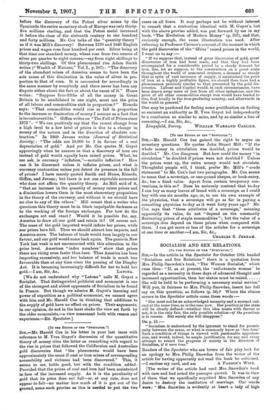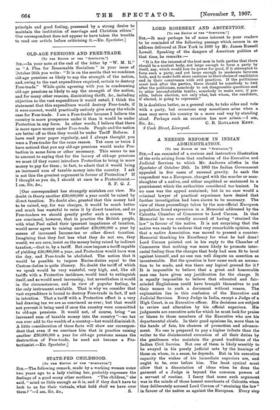SOCIALISM AND SEX RELATIONS.
[TO THN EDITOR OP THB " SPNOTATOR.]
SIR,—In the article in the Spectator for October 19th headed "Socialism and Sex Relations" there is a quotation from Mrs. Philip Snowden's book, "The Woman Socialist," which runs thus : "If, as at present, the 'unfortunate woman' be regarded as a necessity in these days of advanced thought and increased opportunities, then her status must be raised. She will be held to be performing a necessary social service." Will you, in fairness to Mrs. Philip Snowden, insert her full say on this question, as follows (p. 56) ? Where the elision occurs in the Spectator article come these words :— "She must not be an acknowledged necessity and a scorned out- cast at the same time, as is the ease now. Her position in the state will be clearly defined—whether this idea meets with favour or not, it is the only fair, the only possible solution—if the prostitute is to remain. But surely she will disappear."
On p. 51 :—
" Socialism is understood by the ignorant to stand for promis- cuity between the sexes, or what is commonly know as free love.' Such a condition of things is viewed with pardonable apprehen- sion, and would, indeed, be ample justification for any and every attempt to retard the progress of society in the direction of Socialism, i/it were true."
Readers of the Spectator who are lovers of fair play look for
an apology to Mrs. Philip Snowden from the writer of the article for having apparently not read the book he criticised.
—I enclose my card, and am A PARSON'S WIFE.
[The writer of the article had read Mrs. Snowden's book with care and had noted the passages quoted. It was in view of them that we specifically acquitted Mrs. Snowden of any desire to destroy the institution of marriage. Our words were: "Mrs. Snowden is evidently at heart a lady of high principle and good feeling, possessed by a strong desire to maintain the institution of marriage and Christian ethics." Our correspondent does not appear to have taken the trouble to read our article before criticising it.—E. Spectator.]































































 Previous page
Previous page